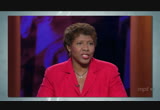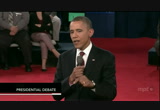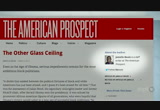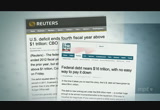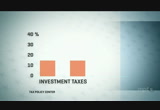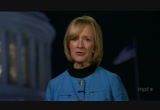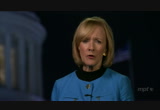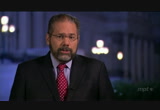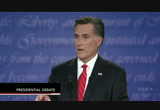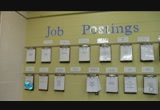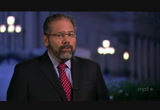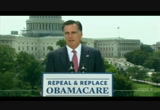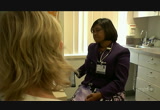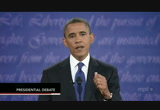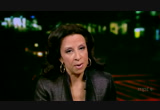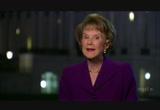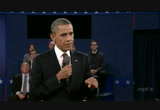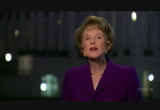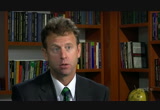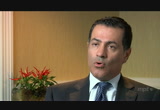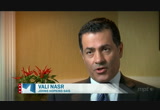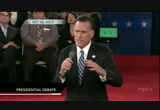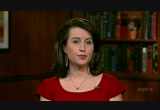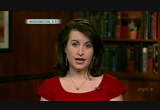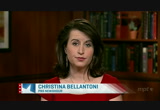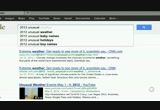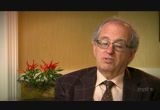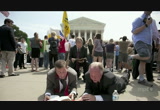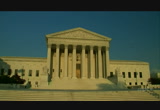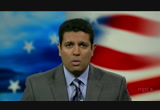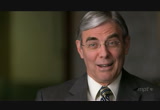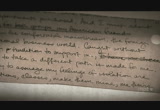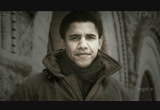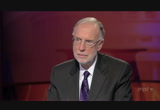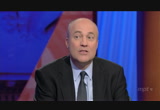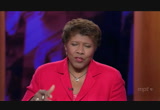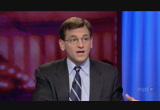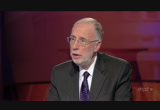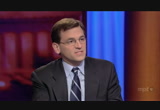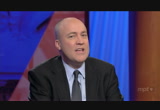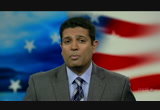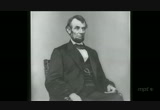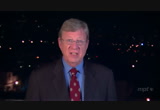tv Charlie Rose PBS November 2, 2012 11:00pm-12:00am EDT
11:00 pm
>> announcer: the following is a pbs election 2012 special presentation made possible by contributions to your pbs station from viewers like you. thank you. >> narrator: tonight, it's the most expensive presidential campaign in american history. with a barrage of negative ads -- >> we can't afford four more years -- >> narration: and court battles over voter eligibility. finally, you get to choose. will either candidate's plan actually work? from the pbs newshour, frontline, washington week, and need to know, this is "election 2012: what's at stake." >> announcer: from the tisch wnet studios in new york, hari sreenivasan. >> thanks for joining us. tonight we are going to do something different. combining the resources of pbs's news and public affairs programs, we are going to look beyond election day and examine
11:01 pm
how barack obama and mitt romney plan to fix some of america's most serious problems. the stakes could not be much higher. nearly five years after the start of the great recession, more than 20 million americans are unemployed or under-employed. the national debt has soared 16 trillion dollars. and our ability to fund medicare is in doubt. tens of millions of americans still don't have medical insurance. and the nation faces challenges around the world -- from the middle east to china. later in the broadcast jeffrey brown of the pbs newshour will look at some critical issues all but been ignored during the campaign. frontline will examine key moments that shaped both candidates' lives when they were young men. political journalists and authors will join gwen ifill on the "washington week" set to discuss how the presidency has transformed many of the men who have won it. and jeff greenfield of "need to know" will weigh in on this question: how can we predict which candidates will become successful presidents?
11:02 pm
but we begin with a look at the most pressing problems facing the nation today, and how the candidates plan to remedy them. after all, the election is a fundamental a clash of ideas. and no matter who is elected tuesday, those problems are not about to go away soon. judy woodfruff of the pbs newshour kicks off our coverage. >> thanks, hari. from the beginning of the 2012 presidential campaign, probably no issues have received more attention than jobs and taxes. and perhaps no issues matter more to millions and millions of voters. so that's where we begin tonight. >> four million jobs. >> five million jobs. >> twelve million new jobs. >> twenty three million new jobs. >> good jobs. >> manufacturing jobs. >> part time jobs. >> jobs of the future. >> president obama repeatedly touts the fact that private employment has now grown every month for the past two and-a-half years. >> and what i want to do, is build on the five million jobs that we've created over the last
11:03 pm
30 months in the private sector alone. >> mitt romney regularly belittles the president's inability to bring the unemployment rate down to much below eight percent and insists he would do better. >> it's not going to be like the last four years. jobs have been too scarce. i know what it takes to bring them back, and i'm going to do that and make sure you get a job. >> but experts say neither candidate has a quick fix for america's sluggish job market, at last count there were an estimated 23 million americans looking for a job or for more work. >> we're dealing with mass unemployment that, in the medium term, will be a big drag on the economy. and so the first priority for any new president ought to be figuring out how we can reduce unemployment by some significant measure. >> jamelle bouie is with the american prospect magazine. he contends mitt romney's proposals to cut personal income and corporate taxes, reduce the size of government, roll back regulation and boost energy
11:04 pm
exploration could generate jobs but only over the long term. moody's analytics estimated that the president's proposed jobs act would have generated 1.9 million jobs through infrastructure projects, the rehiring of public employees, and tax credits. but the bill was blocked in congress. given that. >> it's simply the case that neither candidate has a plan for dealing with the immediate jobs crisis. >> there's not a whole lot of discussion going on about how to promote jobs right now. because what one would normally talk about is more stimulus, either more government spending or more tax cuts. but the deficit situation has now grown so bad that there's just no appetite for further borrowing at this time. >> maya macguineas runs the committee for a responsible federal budget, a bipartisan group that lobbies congress. she says uncertainty about how the government will deal with the deficit and the huge national debt is inhibiting
11:05 pm
employers from hiring. >> in the business world, there's over $2 trillion of cash sitting on the sidelines that could be used to grow the economy, make investments and create jobs. but it's not going to be invested until people know what to expect going forward in the economy. and that's why you need some kind of stability that would come from a big debt deal to help bring that about. >> in fact, unless there is a grand bargain on taxes and government spending by the end of the year, by some estimates, another 2 million people could lose their jobs beginning early next year. that's when the nation would drive off the so-called fiscal cliff. if that were to happen tax rates would go up for nearly every single income group. taxes on investment income would rise. payroll taxes would increase. huge federal spending cuts would be triggered. 1 trillion dollars over 9 years, with the pentagon absorbing about half those cuts.
11:06 pm
by one estimate, the defense industry alone could lose more than 300 thousand jobs. and some 2 million already unemployed americans would lose their benefits. news reports say that a bipartisan senate group is already trying to fashion an agreement combining spending cuts with a tax code overhaul to keep the country out of a new recession. >> and just last week chief executives of 80 major corporations urged congress to fashion a deal to reduce the deficit and said that increased tax revenues have to be part of the bargain. but an overwhelming majority of house and senate republicans have signed the norquist no tax pledge. so many observers think the best congress will be able to do is pass a stopgap measure to get the nation through the immediate crisis. >> they have to violate that pledge if you are gonna come up with a resolution of the fiscal cliff that's gonna work.
11:07 pm
>> norm ornstein is a resident scholar at the american enterprise institute and co-author of the new book, "it's even worse than it looks." he says even if congress were somehow to embrace the president's plan to increase taxes on income above the first $250,000, it would not raise nearly enough revenue to put the nation back on solid financial footing anyway. >> raising taxes on the rich alone, as president obama has pledged, doesn't take us more than a third to a half of the way towards what is a realistic goal. >> even though some conservative economists insist otherwise, ornstein and the nonpartisan tax policy center conclude the arithmetic doesn't work for romney's plan either. the gop candidate would cut spending to domestic government programs and limit tax deductions while lowering income tax rates by 20 percent,
11:08 pm
increasing the pentagon budget and deferring medicare changes for a decade. >> so while the two candidates make their final campaign pushes, given the political gridlock here in washington, it's ultimately unclear how either candidate will be able to create large numbers of jobs anytime quickly or balance the books. on top of that, there's another crisis looming. one of our most important entitlement programs is starting to run out of money. my newshour colleague, ray suarez, picks up the story from here. >> thanks, judy. we may be in a financial hole now, but the situation is about to get a whole lot worse. millions of baby boomers are turning 65, which, of course, makes them eligible for medicare. and that program, which already consumes about a sixth of the entire federal budget on its own, is becoming less and less financially sound. with the country already facing huge debts, fixing medicare becomes even more difficult.
11:09 pm
the question is does either presidential candidate have a politically viable remedy? >> medicare only will be able to pay all of its bills for another dozen years, experts say. after that, unless something changes, it's going to face a budget shortfall that will accelerate over time. >> medicare maybe is in critical condition. by 2030, the number of seniors who are in the program are going to approximately double from what we have today. >> margot sanger-katz is a reporter with the national journal. she says the president's plan to save more than 700 billion dollars by trimming medicare payments to hospitals and doctors and by achieving great healthcare efficiencies is only a start. >> yes we will reform and stengthen medicare for the long haul, but we'll do it by reducing the cost of health care, not by asking seniors to pay thousands of dollars more. >> he'll say that is the solution. i would argue that that's not
11:10 pm
the solution because the number of people who are joining the program is so dramatic that even if we can reduce the costs for each individual person, it's sort of not going to be enough. the number one pressure on the medicare program is really demographic. it's not just about the cost of healthcare. >> the republicans' plan, like the president's, most likely would seek to limit annual medicare increases. the gop would overhaul the program by giving seniors a choice buy medicare or purchase private healthcare insurance. the idea is to achieve savings by creating more competition amongst healthcare providers for seniors' insurance dollars. >> for people coming along that are young, what i do to make sure that we can keep medicare in place for them is to allow them either to choose the current medicare program or a private plan. their choice. >> there's not really a lot of evidence that this idea that competition between insurance plans can lower healthcare costs is gonna work. the most successful program in this country at holding down cost growth for each of its
11:11 pm
beneficiaries actually is medicare. and the reason why that's true is because they have huge negotiating power. they can go to hospitals and say we're not gonna pay for this procedure or that procedure.' and doctors and hospitals basically have to say 'yes' to that, with private insurers, if they only have a small segment of the market they don't have as strong a position so they end up paying higher prices. >> if she's right that neither party's plan works, how would we pay for medicare once the money runs out? one obvious answer is to gradually increase the eligibility age to, say, 67 a politically difficult position even when people are living longer and remember many of the long-term unemployed are now in their 50s and 60s. if they don't get rehired, these already hard-pressed americans would have to pay for their health insurance an additional two years, or go without it. >> and while the politicians here in washington remain at loggerheads, it gradually gets
11:12 pm
harder and harder to pay for medicare and other government programs, even at a time of extraordinarily low interest rates. the problem would only get worse when interest rates rise as prominent ceos recently warned they will if we drive off the fiscal cliff. >> the magic number when it comes to debt reduction is a savings of 4 trillion dollars over a decade. but frankly because so much time has elapsed since that first number came out, it's probably closer to 5 trillion now and probably even larger if you really wanted to get control of the deficit or debt. >> but as congress prepares to return for a chock-filled, lame duck session, those who have worked in, or watch government for a very long time say there is little reason to expect a grand bargain. and with the prospect of another divided congress, finding a way to save medicare might not be in the offing any time soon. >> if anything, the debate about medicare has been tame compared to the debate about healthcare. almost from the start of the
11:13 pm
obama administration, the two parties have been at war about the wisdom, legality and practicality of the affordable care act. what's next when it comes to healthcare? maria hinojosa of need to know has that. >> it's been two and a half years since congress passed the president's controversial affordable care act and four months since the supreme court upheld the heart of the legislation. but most of the bill, which eventually might insure another 30 million people, actually doesn't go into effect until 2014. whether it ever does will depend on what happens next tuesday and not just in the presidential race. >> what the court did not do on it's last day in session, i will do on my first day if elected president of the united states and that is i will act to repeal obamacare. >> mitt romney has said again and again he will get rid of obamacare as soon as he takes office. whether he can might be another story. >> it'd be pretty difficult for him to actually repeal the
11:14 pm
healthcare law within 24 hours. he would need to go to congress and we'd still have to wait and see if republicans are in control of the senate or the house. >> sarah kliff covers healthcare issues for the washington post. while she says democratic control of the senate would throw a wrench into romney's plans, there are immediate steps a romney administration could take to start to undo obama's signature piece of legislation. >> one option the romney administration could pursue is not offering funds to the various departments that are supposed to implement the health care law. that could really slow down and make it very difficult to implement the law even if it were left standing as a law. >> for all the rancor surrounding the legislation, the percentage of americans with medical insurance has barely budged since the law was passed 31 months ago. according to the census an estimated 84.3 percent
11:15 pm
of americans had medical insurance last year compared to 83.7 percent the year before. because of the legislation, a few million young men and women, who would have lost their coverage are now covered by their parents' insurance until they turn 26. but that gain mostly has been offset by additional businesses dropping coverage for their employees. >> still, jennifer ng'andu, of the latino advocacy group, the national council of la raza, says women have already benefitted since the bill's passage by getting a number of new free services. >> screenings like mammograms and cervical cancer, the right to the right types of doctors who uniquely serve women's needs sexual and reproductive health needs, counseling for domestic violence or other relationship issues that deeply affect their health and then access to free birth control, contraception. >> and millions of others will benefit in other ways on january first, 2014, she says, if the
11:16 pm
law remains on the books. at that time the law would prevent insurers from imposing annual limits on the amount of coverage provided. require insurers to provide coverage to people with pre-existing conditions. eventually extend coverage to an estimated 11 million medicaid recipients. and require perhaps 15 million others to choose an insurance plan by shopping for healthcare online at an exchange. >> let me tell you what obamacare did. number one, if you've got health insurance, it doesn't mean a government takeover. you keep your own insurance. you keep your own doctor. number two, if you don't have health insurance, we're essentially setting up a group plan that allows you to benefit from group rates that are typically 18 percent lower than if you're out there trying to get insurance on the individual market. >> another key change coming on january first, 2014, businesses with 50 employees or more will be required to provide
11:17 pm
insurance. otherwise, they'd be fined two thousand dollars for every employee, after the first 30. the idea is to cover sick people with the premiums healthy people pay. but at what cost? >> the number of small businesses i've gone to that are saying they're dropping insurance because they can't afford it, the cost of health care is just prohibitive. and we've got to deal with cost. >> the affordable care act defines all the benefits that an insurance plan has to cover. what that means is that all the states are saying insurance plans that sell in their states have to cover perhaps acupuncture. the concern from some employers is that if you put too many things in as a mandated benefit that health insurance gets really, really expensive. >> the president acknowledges medical costs remain a problem but that increases have slowed dramatically. >> health care premiums have gone up, it's true, but they've gone up slower than any time in the last 50 years.
11:18 pm
>> what's the romney plan for holding down medical costs? his administration might allow insurance companies to offer coverage across state lines to stimulate competition. >> the idea being that it would be much cheaper and that consumers will have a much cheaper option. we have seen this in practice. three states have recently moved to allow sales across state lines. no insurance plans have come into those markets yet mostly because of the challenge of building a network, of finding doctors to work with and finding hospitals. >> democrats, of course, insist that the irony about the current healthcare debate is that much of obama's healthcare plan was modeled on the very plan implemented in massachusetts in 2006, under then governor mitt romney. >> massachusetts once again is taking a giant leap forward. >> romney says he remains proud of the massachusetts plan passed with overwhelming bipartisan support. and even today, a copy of that
11:19 pm
bill is depicted in his official portrait that hangs in the statehouse in boston. >> but the governor says each state should be allowed to devise its own healthcare plan. and of course many in the gop believe the government has no business requiring individuals to buy insurance in the first place. it's still another illustration of the fundamental split between the candidates and their parties about the role of government. the two parties aren't exactly united on foreign policy either. but they're closer. my newshour colleague, margaret warner, is in washington and has our report about that. >> thanks maria. as the campaign hurtles toward election day, much of the foreign policy debate has focused on a few, deadly hours on an infamous date. the attack in benghazi on september 11th that killed u.s. ambassador chris stevens and three other americans has led to a raft of sharp questions, accusations and recriminations.
11:20 pm
>> there were many days that passed before we knew whether we knew if this was a spontaneous demonstration or actually whether it was a terrorist attack. how could we not have known? >> i immediately made sure, number one, we did everything we could to secure those americans who were still in harm's way and most importantly, that we would go after those who killed americans and we would bring them to justice and that's exactly what we are going to do. >> but whether the president wins reelection, or governor romney takes the office, a dizzying array of broader challenges awaits overseas. romney says he'd restore a more assertive american role in the world. and the responsibility of the president to use america's greatest power to shape history not to lead from behind. >> the president says he's demonstrated strength and judgment. >> i said we'd go after al qaeda and bin laden, and we have. >> but the heated rhetoric doesn't offer much of a guidepost on how either would navigate the challenges ahead.
11:21 pm
one issue sure to test either man in the new year, a potential showdown over iran's nuclear program. romney has tried to stake out a tougher line than the president but what he's advocating is close to what the president's already done. both men agree iran must not be permitted to acquire a nuclear weapon. >> make no mistake. a nuclear-armed iran is not a challenge that can be contained. >> i will put the leaders of iran on notice that the united states and our friends and allies will prevent them from acquiring nuclear weapons capability. >> and in their final debate, both men endorsed, for now, employing ever-more crippling sanctions to try to force tehran to halt it's program voluntarily. >> but israeli journalist nathan guttman hears subtle distinctions when it comes to the readiness to attack iran militarily, if negotiations and sanctions fail. guttman believes romney would act sooner. >> he spoke about stopping iran
11:22 pm
from getting nuclear capabilities whereas the obama administration talks about nuclear weapons. this is a subtlety that israelis are concerned about. it means when do you intervene to stop them? romney in that sense seems to be likely to intervene earlier. >> a more immediate challenge may well be, how to keep israel from launching its own attack, as prime minister bibi netanyahu has threatened. and if the israelis do? >> it'll be a tough call. >> michael ohanlon is a senior fellow at the brookings institution. if israel strikes iranian nuclear sites, he says, american involvement then would depend on how iran reacts. >> if they retaliate by striking american assets then it makes it easier for obama or romney to essentially respond in kind. and perhaps they sink part of the iranian navy, but perhaps they also go after those same nuclear sites that israel damaged, but perhaps did not completely destroy. who knows what would come after
11:23 pm
that? that's where the danger lies. >> another major challenge, the messy fallout from the seismic "arab awakening" that began nearly two years ago. bringing the rise of elected islamist governments in egypt and elsewhere -- and a raging civil war in syria. here, too, stark rhetoric masks murky differences. romney says he'd do more to arm syria's rebels but has not said the u.s. would do the arming. the obama white house has resisted doing so, for fear heavy weapons would end up with anti-american jihadists or terrorists. vali nasr is dean of the johns hopkins school of advanced international studies. >> the differences between the candidates at the moment do not appear very large because our response to the arab spring has been fairly consistent across both political parties. >> in afghanistan, likewise, the two candidates agree on withdrawing the remaining
11:24 pm
68,000 combat troops by the end of 2014. and after 2,000 american dead there, 4,000 in iraq, and tens of thousands wounded, neither candidate, much less the american public, seems to have the stomach for another major ground war. the danger in all this, says vali nasr, is that after all this post-9/11 turmoil and war, and the killing of al qaeda leader osama bin laden, the u.s. appears to be disengaging from the middle east and muslim world. >> i've heard it in the persian gulf, from people high up, i've heard it from egyptians, i've heard it from syrians. they are dealing with the united states that is economically hurting. and it's inwardly oriented. the danger of that is that we will end up in a situation where we are not really participating in protecting our vital interests in the region. >> neither candidate has openly espoused disengagement.
11:25 pm
but both are paying more attention to the globe's rising powerhouse to the east asia and in particular, the region's biggest economy, and only u.n. security council member, china. >> it is absolutely vital that we have a strong relationship with china. >> the obama administration has boosted engagement with beijing on a host of issues. but it's also ramped up relations with neighboring countries who are wary of china's rising power even announcing plans to deploy some 2500 u.s. marines to australia. >> romney hasn't commented on those moves. instead, he's charged obama with not being tough enough with china on trade. >> china has been a currency manipulator for years and years and years. and the president has a regular opportunity to label them as a currency manipulator, but refuses to do so. >> the president has responded with some tougher trade moves of his own.
11:26 pm
>> we've put unprecedented trade pressure on china. that's why exports have significantly increased under my presidency. that's going to help to create jobs here. >> but dealing with china ahead is going to be about a lot more than trade, says brookings scholar o'hanlon. >> us-china relations are undoubtedly one of the more complicated matters for any future american president. and for the rest of our lives this relationship is going to be the most important, perhaps, and perhaps the most difficult. >> on that, and so many other issues, the public will have to wait until after the election to get a clearer sense of how differently either man would handle it.
11:27 pm
>> of course, no president can succeed without the support of congress. so how are critical congressional races shaping up? and what impact will the outcome of those contests have on the new president's policy prescriptions? for more about this, i'm joined from washington by christina bellantoni. as most of you know, she is the politics editor of the pbs newshour. so christina, most experts basically think that the house is going to stay republican so let's talk a little bit about the senate. how consequential is this election when it comes to the senate? >> well, it's really important to keep in mind that it's already fairly narrowly divided and when you game out all of the different competitive elections, democrats playing more defense than they are offense and that's in part because they one so many seats in 2006. so chances are that the democrats are going to have a slimmer majority in 2013 and the republicans are going to be able to flip a handful of seats somewhere between two and five, but the democrats may flip a few
11:28 pm
seats. so in the end you're probably going to have a very narrowly divided senate that could make things difficult for whoever the next president is. >> ok, and so let's talk a little bit about policy. what are some of the issues and why is the senate so critical in this? >> well, there are a lot of different things. if mitt romney is elected, for example, he'll have an entire cabinet that will need to get, you know, cleared and approved through the senate. if that's a very narrow division between democrats maybe controlling 51, 50 seats, that's going to be a little difficult for him to get some of his key choices through the senate. now, if he ends up having to moderate those choices that could end up forging some compromise. but on policy issues, you've really got the looming debt crisis is a huge issue both in the house and the senate and the types of people that are elected are going to make a big difference. if very conservative republicans win some of these seats, even in states that aren't considered competitive, that could really push the republicans to challenging president obama in new way if he has a second term.
11:29 pm
or to push mitt romney further to the right on spending issues, cuts to the budget, cuts to the federal programs. so this is really going to be a crucial place because so much of policy ends up stopping in the senate. >> and even supreme court decisions or supreme courts nominees possibly, right? >> yea that's a big issue that you're hearing not that much about on the campaign trail because generally republicans tend to vote in favor of republican nominees and democrats tend to vote in favor of democratic nominees. but, they're not talking about that and there's likely to be at least one vacancy in the coming year. >> and how does that what does that do to the tone and tenor of how compromising or uncompromising the senate becomes? >> one thing to keep an eye on is the fight for leadership because if republicans are in either the majority or minority you're going to have this conservative contingent pushing mitch mcconnell, who's currently the minority leader to be more conservative and right now there's going to be elections for his leadership team the number two and number three.
11:30 pm
and that's going to be a really crucial thing to look at because if you have someone in there, let's say richard murdock for example, if he wins in indiana he's replacing senator richard lugar, known as a compromiser in washington. he's already said compromise is a dirty word. so that could make the tone and tenor of this town get even more difficult for any president to deal with right now and there's already so much vitriol. but if other candidates are able to win it might forge some sort of consensus. >> christina bellantoni from the pbs newshour, thanks so much. >> thank you. >> sometimes during a campaign, it's not what's said that matters. sometimes, it's what's un-said. for all the talk this year about jobs and taxes, the growing national debt, medicare,
11:31 pm
healthcare, israel and iran, there are some very important issues that barely are being mentioned at all. what are they? my colleague, jeffrey brown of the pbs newshour, details a few. >> it's been hot this year - very hot: in fact, the federal government says the first half of 2012 was the hottest since recordkeeping began in the 1890s. it's been dry, extremely dry. the midwest suffered through its worst drought in almost 60 years. and it's been just plain weird with tornados in, of all places, brooklyn and queens. and of course, this weeks massive "frankenstorm." in fact, if you "google" "2012 unusual" the very first thing that pops up in the search field is "2012 unusual weather." >> no one can say with certainty what's behind all of this. but most scientists agree that extreme weather is becoming more common, a consequence of climate change caused by greenhouse gas emissions. it's a problem that could
11:32 pm
eventually affect the way everyone of us lives. >> but consider these statistics during the first two presidential debates, devoted overwhelmingly to domestic issues, the two presidential candidates, the moderators and audience participants mentioned the word "taxes" a total of 63 times, the word "jobs" was mentioned 110 times. but, even if we left this graphic up for the rest of your lives, you would never see the phrase "climate change." that's because it wasn't uttered once during the debates. >> now, the candidates might say, 'well, no one asked us about it'. but they do manage to get in their talking points when they want. and 'climate change' rarely if ever comes up on the campaign trail. norm ornstein thinks he knows why. >> from barack obama's perspective, at a time of a difficult economy, large numbers of voters view anything dealing with the environment as potentially damaging jobs. and romney had to pass a litmus
11:33 pm
test during the primaries, which, was in effect 'climate change is a hoax. don't trust the scientists. >> another largely ignored fact of life in 2012, a series of mass shootings. 2 killed and 9 wounded outside the empire state building. 7 killed at a university in oakland, california. 7 dead at a sikh temple in oak creek, wisconsin. 12 killed and dozens more wounded at a movie theatre in aurora, colorado. and then there was this -- >> i pledge allegiance to the flag of the united states of america and to the republic for which it stands -- >> congresswoman gabby giffords leading the democratic national convention in the pledge of allegiance some 20 months after she was shot in the head in arizona. >> liberty and justice for all. >> there was one brief exchange during the second debate about
11:34 pm
gun violence. >> i also share your belief that weapons that were designed for soldiers in war theaters don't belong on our streets. >> i'm not in favor of new pieces of legislation on guns. and taking guns away or making certain guns illegal. >> but during three hours of debates devoted to domestic matters, the phrase "gun control" was never mentioned, not even by the democratic incumbent. >> how do we balance the rights of gun owners while protecting citizens from mass killings? that's a question not directly addressed in this campaign. and there's more, many of the biggest and most controversial issues of our time will be decided at the supreme court. >> the stakes in this election for the supreme court are very high. >> the scene outside the court last june was a vivid reminder of the extraordinary powers vested in each of its nine justices. after years of wrangling, a single unexpected vote by chief justice john roberts supporting
11:35 pm
the constitutionality of the president's healthcare bill meant that the central provision of the law would stand. millions cheered, millions jeered. other charged issues might well also be settled by a single vote, according to joan biskupic, who covers the court for reuters. >> this is a very divided court on just about every issue that americans care about. abortion rights. gun rights. we end up with five to four decisions on many important cases. the change in just one individual on the court could swing an entire case. >> today, four of the justices are in their mid-to-late 70s. if there are openings in the coming four years, the next president, through his nominations, will have the chance to influence the direction of the court for decades to come. and yet, during those same two debates about domestic issues, the phrase "supreme court" was mentioned just one time. >> so, hari, as voters around the nation prepare to cast their ballots, there's no question
11:36 pm
they'll want to consider the candidates' positions on issues getting the bulk of the attention. but they might also take a hard look at the issues not featured prominently in the campaign, those the candidates, for whatever reason, seem to avoid. >> for continuing coverage of "election 2012: what's at stake," including more about the issues and stories featured in tonight's program, please visit pbs.org/newshour. >> we've spent most of this broadcast describing the biggest problems facing the nation and the candidates' proposals to fix them. but maybe none of that matters to you. maybe you simply vote for the candidate who appeals to you more. even if you do, how much do you really know about either mitt romney or barack obama? what were the key moments that shaped their lives as young men? more on that tonight from frontline. the material is from the documentary, "the choice." >> in 1966 the mormon church
11:37 pm
called mitt romney at the end of his freshman year at stanford. it was time to become a mormon missionary. >> you are sort of sent out on your own in very difficult circumstances to sort of prove your stuff. >> the church was sending mitt away to spend twoand half years on a mission in france. >> as mitt romney has said, imagine going to bordeaux and saying to people, 'i've got a great new religion for you and, by the way, give up your wine.' >> the task, to put on a suit and tie, and climb on your bicycle -- >> the tried and true and well worn method was knocking on doors. and so we knocked on thousands and thousands and thousands of doors. >> the mormon mission does teach you to deal with rejection. most people are not thrilled to see a pair of mormon missionaries on their door.
11:38 pm
>> and it means cultivating your own inner spiritual life. where else are you going to get the resources and the strength to carry on this difficult work unless you feel like god is with you? >> then a life changing moment. >> mitt romney is driving. they are coming around a curve in this small remote town. there are six people in the car. >> he went around the bend and he saw that there was a, at a high rate of speed, another person coming right towards him. >> one of the policemen who had shown up as the first responder, if you will, had actually written in his passport 'il est mort,' which means 'he is dead.' >> mitt woke up in a ward, and he didn't know where he was. and then for a period of time, he didn't have any feeling in one side of his face. >> he had survived, but the wife of the mission president, sitting right next to him, was killed.
11:39 pm
>> you have to understand the mission president was like the surrogate father there. his wife, the surrogate mother, the mission mother. and she was to many of us mother there. and so it was an awful loss for us that she was killed. >> in the wake of the tragedy mitt's friends say he showed surprising resilience. >> i think part of that is because of our faith. a deep conviction that this isn't the end of all life; it's just the end of mortal life. that there's purpose beyond this life. and that sister anderson now had gone on, and would be involved in great work going on on the other side of the veil. >> the president returned home. the mission in paris was leaderless. someone needed to take over. >> he immediately starts kind of establishing himself as a leader within the church because there's a vacuum. >> those closest to him say the experience had changed him. >> and he made a commitment to
11:40 pm
himself to work as hard. and i think part of that comes from that experience of going overseas and seeing other people, and having life-threatening experiences and deciding that you're going to-what you're going to make out of your life. and he decided he wanted to make the most he could out of his life, and worked as hard as he possibly could to do that. >> in 1981 barack obama came east to engage the world. especially the black world. he started by moving to the edge of harlem. >> well, if we wanted things to be harder for ourselves, we succeeded wonderfully. it was kind of a gritty neighborhood. the apartment next door to us on the third floor was burned out and stayed that way the whole time that we lived there. we had, like, five locks on the door, including one of those bars you put in after you've gone inside the apartment. >> well, new york to me is the key to his life.
11:41 pm
it's the period where he does the least, but figures out the most. >> to find a connection to the black community obama headed out into harlem and all over the city. but it turned out to be harder than obama imagined. >> he told me this when i interviewed him in the white house. he made no lasting african-american friends during those four years in new york. >> the new york years are marked by this kind of turning inward. he spends time reading, fasting, wandering the city. there's this almost monk-like existence. >> as he walked the streets. friends say he was affected by the poverty all around him. >> i saw a transformation in the barry i had met. he got very serious and less lighthearted and our conversations were more about serious things, wouldn't want to go around the bar, have a drink, was worried about poor people,
11:42 pm
didn't care about getting rich. i mean that's my opinion of dull at that time. >> there is one great letter where he describes how all of his friends are sort of getting into the mainstream and his pakistani friends are all moving toward the business world. and to him all of that seems too small, too categorized, too limiting. >> caught without a class, a structure, or tradition to support me, in a sense the choice to take a different path is made for me. the only way to assuage my feelings of isolation are to absorb all the traditions classes; make them mine, me theirs. >> and, he's trying to say, 'where do i fit? for me to exist, i have to be larger than it. i have to embrace it all, make it mine.' he writes that.
11:43 pm
and i think in that simple sentence you see everything about who he wanted to be and what he needed. he didn't want to be limited. >> obama had discovered something important about himself. something that would help shape the rest of his life. >> what obama has figured out by the time he leaves new york is that it is possible for him to be in a black community, while maintaining that larger sensibility of being a product of the world and open to the diversity, the vast diversity of this country and the world. they don't have to be in conflict, he doesn't have to choose between one or the other. he has figured his way to get both. >> "the choice" will air on many pbs stations immediately after our broadcast tonight. hundreds of candidates have sought the presidency.
11:44 pm
but only a few dozens have held the office. and even fewer have left office unchanged by the job. all you have to do is look at photographs of some recent presidents at the start of their terms, and then at the end, to appreciate the toll the job takes. the fact is, candidates are transformed by the presidency. for much more about all of this, we turn next to gwen ifill, the moderator and managing editor of "washington week." >> thanks, hari. in less than a week one of these candidates will be transformed from partisan scrapper to bi-partisan hero. relatively few men have had to meet this challenge, these three authors have chronicled that transformation. peter baker of the new york times has written about the presidencies of bill clinton and george w. bush. dan balz of "the washington post" is author of a narrative of the 2008 campaign. and michael duffy of "time magazine" is author of a book about the world's most exclusive fraternity. the name of that book is "the presidents club." michael duffy as these presidents go from being
11:45 pm
campaigners to being presidents, how are they transformed? >> you know we asked a couple of the presidents who are still alive what they remember the big surprise or the big shock being when they finally stepped from being candidate into the oval office. and they say three things. one is the speed of the decisions come much faster. and unpredictably. they can't control the agenda. the second is, they're all hard. there are no easy ones and they all are fairly outspoken about just how difficult the choices are. basically there are downsides everywhere. and the third thing is that's a little more interesting. just because you make the decision doesn't mean anything happens. when ike took over from truman, truman said "poor ike, he'll think it's just like the army. do this and do that. only this time nothing's going to happen when he says it." and that's something you even see now, 60 or 70 years later, that it's harder to make change than they think. >> it's ambition, isn't it. there's all this ambition in the campaign. and then you get to reality once you get in the white house, dan. >> well, the interesting thing. and a campaign is all about drawing contrasts and suggesting
11:46 pm
you are going to do big and difficult things that your opponent has not been able to do or wouldn't do, and you get into office and you find, as michael was saying, you are hemmed in by all kinds of institutional strictures. working with the congress is much more difficult than anybody anticipated. both the last two presidents, president obama, and president george w. bush talked about how they would change washington and neither was successful in doing that. there's that element. and again, as mike said, things come at you, you don't have the kind of control that you think. and the third thing i think that's different is that there is a sense of continuity about a lot of policy, particularly foreign policy, and in a campaign you can draw sharp distinctions and once you get into office, continuity tends to force you into a narrower band than you had talked about in the campaign. >> peter you've covered, are writing about george w. bush. now, and you've written about bill clinton. two very different presidents who have had two very different ideas about what the presidency would be. >> oh, absolutely and in fact though in some ways there's a commonality, and michael's written about this, they didn't much like each other obviously
11:47 pm
in 1992 when bill clinton beat george w's father or in 2000 when george w. beat bill clinton's vice president. today they are fast friends. why? because in fact they discovered that there really is more alike in being president, than different, depending on the parties. and there are the factors that michael and dan just talked about, the intractability of the problems, the unnecessary partisanship that comes with the job and you see candidates in the last stages of an election begin to realize they might win. and i think you saw that this fall, during the foreign policy debate, when mitt romney gave his answer on china. and the answer he gave, he was still tough, but he prefaced it with a whole monologue about how we want to be partners with china. none of the red meat kind of stuff you heard during the campaign, because he realizes that come january 20th he might be dealing with china as a president. >> that's what happens when possibilities expand. what happens when ambitions shrink? >> someone who briefed bill
11:48 pm
clinton every day, for the last two years, and then briefed george bush every day for the first two years of his office said they come in and here's what happens three things. one, they come in and think "uh-oh, i've been set up. this is much worse than i realized." the second thing they think is "wait a minute, the guy who had it before me, he didn't really have it so wrong after all." which they don't expect. and the third thing is "who am i going to talk to about this?" these problems are so complicated, they're not anything like what i campaigned on, the agenda is so much more different than what i expected, that they search beyond what they expect in terms of their advice, their political advisors, they find that they want a much broader spectrum of advice than they usually think. >> so they call each other? >> and then they call each other. >> what about voters expectations? >> well it's interesting. there are two views that voters have. one is that they distrust all politicians promises and they think that politicians will never fulfill them and on the other hand they want politicians to fulfill the promises that were set out in the campaign. and when they don't people are let down. we've seen that in this
11:49 pm
administration with in a sense, unreal expectations that were created during the last campaign, both by obama himself and by the people who were supporting him and when he was not able to do that, people were disappointed in that. and so a president has to figure out how to calibrate that, you have to tone it somewhat as a candidate and you have to be prepared when you come into office. >> if you are a second term, someone who is seeking a second term, like barack obama, versus someone who is seeking his first term in office like mitt romney, how is this a different moment? >> well, for one thing you know it's your last campaign, right? and you hear president obama talk about that in the campaign trail. these are the final days, of my final campaign. you begin to look ahead not to, every first term president wants the same thing, a second term. every second term president is thinking about one thing, and that's their legacy. what are they going to leave behind when they are done, what will history say about them? so the minute you've won that second term, instead of relief, i think you begin to start
11:50 pm
thinking about the judge that will be even harsher than the voters, come four years hence. and you realize that the clock is ticking so fast. somebody told me yesterday that a second term president has fourteen good months at the beginning of his term. and fourteen good months at the end, and the middle is a mush. and i have to figure out how to use that to achieve something that's meaningful. >> i've been struck recently, in the last four or five presidential campaigns, how it's become kind of de rigueur standard to promise the voters who you are running for the first time what you will do one the first day. and it speaks to the voters i think increasing sense that no matter who we elect, nothing may change, or they can't get anything done, sort of like what truman told ike, and so now, romney's planning to you know call china currency violator or something, and clinton and george w. bush had first day promises as well. they know that there's a big difference coming and that it's relatively easy to campaign and do the symbolic gesture but the harder work of governing is a completely different kettle of fish. >> it's one of the reasons that in second terms presidents often turn more to foreign policy than
11:51 pm
domestic policy, because the window is so short for getting something big done on domestic policy, whereas when you are dealing with foreign policy you've got that four years to run and we've seen presidents who've had significant accomplishments in the last couple of years of their presidency. >> what you all have discovered as authors of current history is that all past is prologue and we are just waiting to see what the prologue is going to be. thank you all very much michael duffy of time magazine, dan balz of "the washington post," peter baker of "the new york times." >> you go to the polls to choose the presidential candidate who will help the nation most. but predicting which candidates will succeed based on their life experience is anything but a sure thing. jeff greenfield of "need to know" looks back over the years and shares some surprising details about some of our most
11:52 pm
successful presidents. >> on tuesday, more than 120 million of us will choose a president; and there are almost as many reasons why each of us will make that choice. maybe it's the party, or a specific policy, or a sense of satisfaction or disappointment in the man who now holds the job. but underlying this choice is a broader question: how do we know who will make a good president? years ago, i asked the famed historian david mcculloch that question; and he gave a crisp, clear answer, you can't. >> how about an ex-one term congressman, a man of no prepossessing appearance, who'd lost his last two political campaigns. not too impressive, is it until you remember we're talking about abraham lincoln, who led the country through its most severe threat to survival. what about someone who never got a college education-who failed in business-who was an ally of a thoroughly corrupt political machine? well, history has been pretty kind to harry truman, whose post-war leadership put europe
11:53 pm
back on its feet, and who combined strength and judgment. and was it really likely that an ex-actor, who launched his political career with a speech on behalf of one of the most unsuccessful candidates in history, would win two landslide victories and remain as the single most revered figure in his party? even some liberal historians now give ronald reagan high marks for helping to end the cold war. and it's not as though we know what experience will best serve in the oval office. no one knew the congress better than lyndon johnson. he'd spent his life there. but johnson saw the world through that prism. he could not comprehend, for instance, that north vietnam's leaders did not want a hydroelectric dam-they wanted a country, and would fight for it as long as it took to win. do you look for early clues? franklin roosevelt's relatives were so dismissive of his seriousness that they said, "fdr stands for 'feather duster roosevelt'." but no one was better suited by temperament to lead america through the great depression and the second world war.
11:54 pm
is psychology an insight? well, consider johnson, nixon, ford, reagan, clinton, obama, all were men whose fathers were missing from their lives, or who had failed in their work. but these presidents were very different leaders. or consider john kennedy his private life was reckless enough to cast grave doubt on his judgment but in the cuban missile crisis, with the fate of the world literally at stake, he was cautious, prudent and that helped avoid disaster. >> when i pressed david mcculloch, he did offer two traits critical to any president, first, a sense of humor. second, a sense of tragedy. the first, to leaven the burden of the office. the second, to understand the limits of what any leader can do, to avoid the danger of overreach, of hubris. not a bad set of guides to take into the voting booth on tuesday. >> cast a vote before election
11:55 pm
day in our online poll. which candidate would do a better job fixing the economy? let us know what you think and why. visit pbs.org/ need to know. >> just a quick personal note before we go. in addition to everything we've talked about tonight, and the pressing issues facing the nation, there are lots of smaller but equally important reasons to go to the polls on tuesday beyond the presidential election. whether they are local ballot initiatives, bond measures, state referendums, it doesn't matter if you're in a battleground state, it's your opportunity to express yourself in decisions that are often decided by a handful of votes. so please go vote. i'm hari sreenivasen. thanks for watching "election 2012 what's at stake."
806 Views
IN COLLECTIONS
WMPT (PBS) Television Archive
Television Archive  Television Archive News Search Service
Television Archive News Search Service 
Uploaded by TV Archive on

 Live Music Archive
Live Music Archive Librivox Free Audio
Librivox Free Audio Metropolitan Museum
Metropolitan Museum Cleveland Museum of Art
Cleveland Museum of Art Internet Arcade
Internet Arcade Console Living Room
Console Living Room Books to Borrow
Books to Borrow Open Library
Open Library TV News
TV News Understanding 9/11
Understanding 9/11

